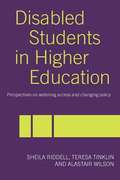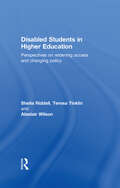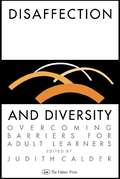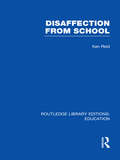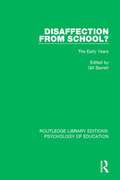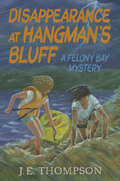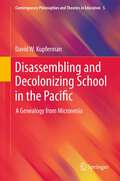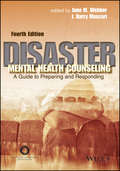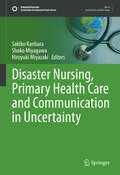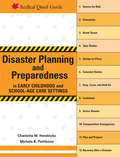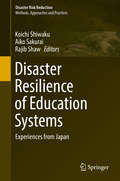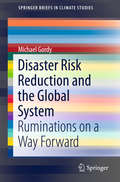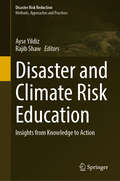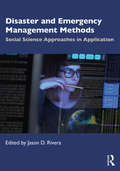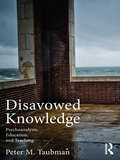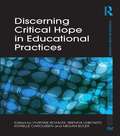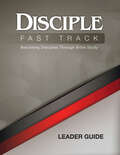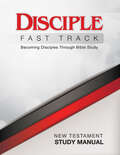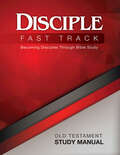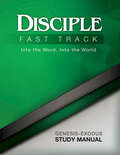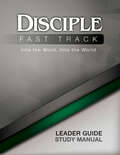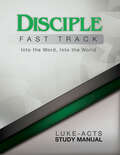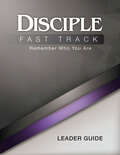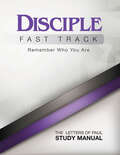- Table View
- List View
Disabled Students in Higher Education: Perspectives on Widening Access and Changing Policy
by Sheila Riddell Teresa Tinklin Alastair WilsonThe authors present results gleaned from eight higher education institutions in Great Britain which demonstrate the level of participation by disabled students.
Disabled Students in Higher Education: Perspectives on Widening Access and Changing Policy (Scre Research Report Ser. #No. 85)
by Sheila Riddell Teresa Tinklin Alastair WilsonAs wider access to higher education becomes a top priority for governments in the UK and around the world, this ground-breaking piece of work raises the challenging questions that policy-makers, vice-chancellors and government officials are reluctant to ask. A highly qualified team of authors have closely analyzed rates of participation and the experiences of disabled students in higher education over a two year period. They compare the responses of eight different universities to the new anti-discriminatory practice, contrasting their social profiles, academic missions, support systems for disabled students and approaches for the implementation of change. Change comes under particular scrutiny, with a close examination of each university’s interpretation of ‘reasonable adjustments’, and the extent to which they have modified their campuses and teaching accordingly. Student case studies are used throughout to illustrate the real impact of institutional responses to the legislation. Disabled Students in Higher Education will make fascinating reading for students of education, social policy, politics, and disability studies, and for those working towards accredited university teacher status.
Disaffection And Diversity: Overcoming Barriers For Adult Learners (Education And Alienation Ser. #Vol. 11)
by Judith CalderFirst Published in 1993. Routledge is an imprint of Taylor & Francis, an informa company.
Disaffection From School (Routledge Library Editions: Education)
by Stephen Hester David H Hargreaves Frank J MellorA large number of pupils are, or are liable to become, disaffected with their schooling. In this comprehensive account of the problem, Ken Reid suggests that school can and should do much more to prevent and overcome disaffected behaviour, as manifested by such factors as absenteeism, disruption and underachievement. The book covers disruptive behaviour in its broader context and examines the search for an explanation within schools themselves. Formal and multidisciplinary approaches to the problem are also fully treated. The author has drawn on his considerable school and research experience and the book is well illustrated with examples and case histories. Ken Reid argues that questions about attitudes and approaches in teaching and in pastoral care provoke a continued challenge, and stresses that if such questions are not faced squarely the long-germ prognosis for secondary education in Britain may be bleak. Teachers in training and all those involved in the education and welfare of difficult or disadvantaged children, especially teachers, heads and social workers, will find Disaffection from School both challenging in its analysis and helpful in its suggestions.
Disaffection from School?: The Early Years (Routledge Library Editions: Psychology of Education)
by Gill BarrettOriginally published in 1989, the purpose of this book was to explore the nature and appearance of disaffection and alienation in young children and to seek to understand its significance. It deals with classroom interactions and adult expectations of children, and the context of historical and policy-related perspectives on schools as they relate to the under-8-year-olds. Theories and assumptions about these young children are re-examined, leading to questions on interpretation of behaviours, the appropriateness of practices at the classroom, teacher education and policy levels, and the societal value that was placed on the schooling experience of young children at the time.
Disappearance at Hangman's Bluff (No Series (generic) Ser.)
by J. E. ThompsonIn South Carolina, young friends Abbey and Bee see their neighbor's dog, Yemassee, getting kidnapped by a couple of rough-looking fellas with guns. What does this mean? Abbey knows one thing: if you try to mess with her family, friends, or friends' dogs, you've got trouble on your hands.
Disassembling and Decolonizing School in the Pacific
by David W. KupfermanSchooling in the region known as Micronesia is today a normalized, ubiquitous, and largely unexamined habit. As a result, many of its effects have also gone unnoticed and unchallenged. By interrogating the processes of normalization and governmentality that circulate and operate through schooling in the region through the deployment of Foucaultian conceptions of power, knowledge, and subjectivity, this work destabilizes conventional notions of schooling's neutrality, self-evident benefit, and its role as the key to contemporary notions of so-called political, economic, and social development. This work aims to disquiet the idea that school today is both rooted in some distant past and a force for decolonization and the postcolonial moment. Instead, through a genealogy of schooling, the author argues that school as it is currently practiced in the region is the product of the present, emerging from the mid-1960s shift in US policy in the islands, the very moment when the US was trying to simultaneously prepare the islands for putative self-determination while producing ever-increasing colonial relations through the practice of schooling. The work goes on to conduct a genealogy of the various subjectivities produced through this present schooling practice, notably the student, the teacher, and the child/parent/family. It concludes by offering a counter-discourse to the normalized narrative of schooling, and suggests that what is displaced and foreclosed on by that narrative in fact holds a possible key to meaningful decolonization and self-determination.
Disaster Management Law
by Bhim Charan Roy Md Abdul BarikThis is about Disaster Management Law in Bangladesh.
Disaster Mental Health Counseling: A Guide to Preparing and Responding
by Jane M. Webber J. Barry MascariThis timely book provides current research and skill-building information on Disaster Mental Health Counseling for counselors, educators, students, and mental health responders in agencies, schools, universities, and private practice. Recognized experts in the field detail effective clinical interventions with survivors in the immediate, intermediate, and long-term aftermath of traumatic events. This extensively revised edition, which meets 2016 CACREP Standards for disaster and trauma competencies, is divided into three sections: Disaster Mental Health Counseling Foundations, Disaster and Trauma Response in the Community, and Disasters and Mass Violence at Schools and Universities. Real-world responses to violence and tragedies among diverse populations in a variety of settings are presented, and responders share their personal stories and vital lessons learned through an "In Our Own Words" feature. Each chapter contains discussion questions and case studies are interwoven throughout the text. Requests for digital versions from the ACA can be found on wiley.com. To request print copies, please visit the ACA website here. Reproduction requests for material from books published by ACA should be directed to permissions@counseling.org
Disaster Nursing, Primary Health Care and Communication in Uncertainty (Sustainable Development Goals Series)
by Sakiko Kanbara Shoko Miyagawa Hiroyuki MiyazakiThe primary aim of this textbook is to contribute towards the promotion of human security by educating nurses with a profound understanding of disaster nursing and to conduct innovative research and practices in cooperation. This textbook emphasizes on multi-professional connections; offers knowledge on how Japanese disaster nursing got evolved in changing social contexts and provides various case studies that reflect wonderful practices in the disaster nursing field which have contributed to the Sendai Framework for Disaster Risk Reduction, the UN Sustainable Development Goals, and sustainable human security. Frequent disasters have triggered the need for more trans-disciplinary work, high-level care throughout all phases of a disaster event, and the need for nursing leaders. Apart from hospitals, in local communities, nurses can take a role to mitigate health risks. Being a member of every part of the healthcare system, they can become critically needed leaders in emergency management and disaster preparedness. This work includes a DRR Framework and the application to disaster nursing, information on preparedness and community resilience and on the related disciplines and coordination with disaster nursing. It informs on the challenges in disaster nursing, offers instructional design, education development and research in disaster nursing. Students, professional nurses, clinicians, community health practitioners, health volunteers, disaster support organizations, researchers, and community partners who are involved in the care of disaster survivors can use this resource. Written by distinguished experts with diverse backgrounds of nursing, public health, health informatics, and geography, this book shows how practitioners, researchers, policymakers, and multiple community stakeholders who can collaborate effectively and efficiently to restore primary health care of survivors after a local disaster.
Disaster Planning and Preparedness in Early Childhood and School-Age Care Settings
by Charlotte M. Hendricks Michele B. PettiboneAll adults who are responsible for the care of children should be prepared for disasters. This guide provides caregivers, educators, and program staff with preparation tips and step-by-step responses to disaster situations that are based on national standards and best practices to keep children safe.
Disaster Resilience of Education Systems
by Rajib Shaw Koichi Shiwaku Aiko SakuraiEducation is regarded as a cross-cutting issue for disaster risk reduction (DRR) through reviewing the Sendai Framework for DRR (SFDRR) 2015-2030. Mainstreaming Disaster Risk Reduction (DRR) in the education sector is one of the important efforts to enhance resilience in a community. DRR in the education sector not only focuses on provision of disaster education, but also includes securing a safe school environment, developing school disaster management plans, and building the capacity of school teachers and local educational officers. Japan, with its wealth of experience in DRR, has developed a good resilient system in its education sector, which has been tested and revised through experiences of past disasters. This book reviews the evolution of DRR in the education sector in Japan, including some of the recent developments after the 2011 Great East Japan Earthquake, focusing on DRR governance and practices in national policies, curriculum development and teacher training, community linkage, and international cooperation, to enhance resilience in the education sector. The primary target groups for this book are students and researchers in the fields of disaster management and DRR studies. Another target group comprises practitioners and policy makers, who will be able to apply the collective knowledge from this work to policy and decision making. The book provides an overview of the current research trends and furnishes basic knowledge on this important topic.
Disaster Risk Reduction and the Global System
by Michael GordyThis short manuscript is both a distillation of some of the latest work on disaster risk reduction and an interpretation of this distillation from the author's political economic perspective. It is based on information found in the flagship reports on disaster risk reduction of the United Nations. The book sums up and interprets issues of disaster risk reduction and makes them accessible to professional and non-professional readers alike, including governmental policy makers.
Disaster and Climate Risk Education: Insights from Knowledge to Action (Disaster Risk Reduction)
by Rajib Shaw Ayse YildizEducation serves as a cornerstone for gaining knowledge and taking initiative. However, despite efforts in disaster and climate risk education (DCRE), a gap often exists between awareness and meaningful action. To bridge this gap and promote a progression from awareness to empowerment, we offer the KIDA (Knowledge Interest Desire Action) framework. The foundation of this framework is a collaboration between schools, communities, and families, which calls for support from educational boards and local governments. Following international tragedies like the Turkey-Syria earthquake of 2023, as well as the ever-changing difficulties posed by climate change, DCRE has to be given priority immediately. Our book proposes a comprehensive strategy that includes governance, capacity building, education in schools and the community, and technology integration. Our insights, analyses, and practical policy suggestions are based on multidisciplinary research and worldwide case studies, with the goal of strengthening resilience and cultivating a generation committed to sustainability. This book provides a comprehensive exploration of DCRE. It aims to prepare individuals and communities to face the challenges of a changing world head-on by improving knowledge and promoting preparedness.
Disaster and Emergency Management Methods: Social Science Approaches in Application
by Jason D. RiveraFind the answers to disaster and emergency management research questions with Disaster and Emergency Management Methods. Written to engage students and to provide a flexible foundation for instructors and practitioners, this interdisciplinary textbook provides a holistic understanding of disaster and emergency management research methods used in the field. The disaster and emergency management contexts have a host of challenges that affect the research process that subsequently shape methodological approaches, data quality, analysis and inferences. In this book, readers are presented with the considerations that must be made before engaging in the research process, in addition to a variety of qualitative and quantitative methodological approaches that are currently being used in the discipline. Current, relevant, and fascinating real-world applications provide a window into how each approach is being applied in the field. Disaster and Emergency Management Methods serves as an effective way to empower readers to approach their own study of disaster and emergency management research methods with confidence.
Disavowed Knowledge: Psychoanalysis, Education, and Teaching (Studies in Curriculum Theory Series)
by Peter Maas TaubmanThis is the first and only book to detail the history of the century-long relationship between education and psychoanalysis. Relying on primary and secondary sources, it provides not only a historical context but also a psychoanalytically informed analysis. In considering what it means to think about teaching from a psychoanalytic perspective and in reviewing the various approaches to and theories about teaching and curriculum that have been informed by psychoanalysis in the twentieth century, Taubman uses the concept of disavowal and focuses on the effects of disavowed knowledge within both psychoanalysis and education and on the relationship between them. Tracing three historical periods of the waxing and waning of the medical/therapeutic and emancipatory projects of psychoanalysis and education, the thrust of the book is for psychoanalysis and education to come together as an emancipatory project. Supplementing the recent work of educational scholars using psychoanalytic concepts to understand teaching, education, and schooling, it works to articulate the stranded histories ─ the history of what could have been and might still be in the relationship between psychoanalysis and education.
Discerning Critical Hope in Educational Practices (Foundations and Futures of Education)
by Vivienne Bozalek Brenda Leibowitz Ronelle Carolissen Megan BolerHow can discerning critical hope enable us to develop innovative forms of teaching, learning and social practices that begin to address issues of marginalization, privilege and access across different contexts? At this millennial point in history, questions of cynicism, despair and hope arise at every turn, especially within areas of research into social justice and the struggle for transformation in education. While a sense of fatalism and despair is easily recognizable, establishing compelling bases for hope is more difficult. This book addresses the absence of sustained analyses of hope that simultaneously recognize the hard edges of why we despair. The volume posits the notion of critical hope not only as conceptual and theoretical, but also as an action-oriented response to despair. Our notion of critical hope is used in two ways: it is used firstly as a unitary concept which cannot be disaggregated into either hopefulness or criticality, and secondly, as an analytical concept, where critical hope is engaged and diversely theorized in ways that recognize aspects of individual and collective directions of critical hope. The book is divided into four sub-sections: Critical Hope in Education Critical Hope and a Critique of Neoliberalism Critical Race Theory/Postcolonial Perspectives on Critical Hope Philosophical Overviews of Critical Hope. Education can be a purveyor of critical hope, but it also requires critical hope so that it, as a sector itself, can be transformative. With contributions from international experts in the field, the book will be of value to all academics and practitioners working in the field of education.
Disciple Fast Track Becoming Disciples Through Bible Study Leader Guide: Becoming Disciples Through Bible Study
by Julia Kitchens Wilke Trust Richard B. WilkeNo additional preparation is needed for the Leader—just follow the Guide. Use the guide in class only. What could be easier?Disciple Fast Track, an adaptation of the original, bestselling Disciple Bible Study, provides a viable option for busy people seeking comprehensive engagement over time with the entire biblical text. Fast Track groups meet for a total of 24 weeks, devoting 12 weeks each to the Old Testament and the New Testament. Participants read a manageable 3-5 chapters of the Bible daily in preparation for the weekly meetings, which last approximately 75 minutes.A brief, illustrated review video enables participants to recall important facts and ideas; lively and engaging video presenters then offer insights into the current week’s session. Participants have the opportunity to take a spiritual gifts assessment and determine meaningful ways they can serve and live out their discipleship commitment. They also have opportunities for celebrations marking their completion of the Old and New Testament components of Disciple Fast Track. The flexible resources work well with groups of a few participants up to 100.
Disciple Fast Track Becoming Disciples Through Bible Study New Testament Study Manual: Becoming Disciples Through Bible Study
by Elaine Friedrich Julia Kitchens Wilke Trust Richard B. WilkeThis 12-week study immerses the participant in the New Testament.Disciple Fast Track, an adaptation of the original, bestselling Disciple Bible Study, provides a viable option for busy people seeking comprehensive engagement over time with the entire biblical text. Fast Track groups meet for a total of 24 weeks, devoting 12 weeks each to the Old Testament and the New Testament. Participants read a manageable 3-5 chapters of the Bible daily in preparation for the weekly meetings, which last approximately 75 minutes. A separate Leader Guide provides group facilitators with step-by-step instructions for leading each week’s session without any extra preparation.A brief, illustrated review video enables participants to recall important facts and ideas; lively and engaging video presenters then offer insights into the current week’s session. Participants have the opportunity to take a spiritual gifts assessment and determine meaningful ways they can serve and live out their discipleship commitment. They also have opportunities for celebrations marking their completion of the Old and New Testament components of Disciple Fast Track. The flexible resources work well with groups of a few participants up to 100.
Disciple Fast Track Becoming Disciples Through Bible Study Old Testament Study Manual: Becoming Disciples Through Bible Study
by Julia Kitchens Wilke Trust Richard B. WilkeThis 12-week study immerses the participant in the Old Testament.Disciple Fast Track, an adaptation of the original, bestselling Disciple Bible Study, provides a viable option for busy people seeking comprehensive engagement over time with the entire biblical text. Fast Track groups meet for a total of 24 weeks, devoting 12 weeks each to the Old Testament and the New Testament. Participants read a manageable 3-5 chapters of the Bible daily in preparation for the weekly meetings, which last approximately 75 minutes. A separate Leader Guide provides group facilitators with step-by-step instructions for leading each week’s session without any extra preparation.A brief, illustrated review video enables participants to recall important facts and ideas; lively and engaging video presenters then offer insights into the current week’s session. Participants have the opportunity to take a spiritual gifts assessment and determine meaningful ways they can serve and live out their discipleship commitment. They also have opportunities for celebrations marking their completion of the Old and New Testament components of Disciple Fast Track. The flexible resources work well with groups of a few participants up to 100.
Disciple Fast Track Into the Word Into the World Genesis-Exodus Study Manual
by Richard B. Wilke Susan Wilke Fuquay Elaine Friedrich Julia Kitchens Wilke TrustThis 12-week study will immerse you in the books of Genesis and Exodus.Disciple Fast Track Into the Word Into the World is an adaptation of the original, bestselling Disciple Bible Study Into the Word Into the World. The study is ideal for busy people who want to fit an in-depth Bible study into their schedule. The study retains the familiar Disciple format with its theme word, theme verse, statement of the human condition, daily and weekly assignments, and prayer.Into the Word helps readers deepen their understanding of Scripture and make connections between what they already know and what they are reading. Each week you will encounter three spiritual disciplines, learn what they are, and how you can engage those disciplines. The first discipline varies from week to week, then moves into Sabbath and prayer. In every session, you commit to how you will respond to Scripture in terms of ministry in the world.Into the World identifies some needs in the world for which ministry is needed and suggests possible responses, then invites participants to summarize the scripture message that will shape their ministry and to decide what response and commitment to make to that message. Each week you will be guided in experiencing the gift of Sabbath rest and renewal. Classes meet for a total of 24 weeks, studying Genesis-Exodus and Luke–Acts for 12 sessions each. Daily preparation is manageable, with 3–5 chapters of the Bible to read each day.Minimal additional preparation is needed for the leader—just follow the Guide. Weekly sessions last 75 minutes. Four hosts will provide 3–5 minute video insights related to the week's session. Flexible for use with small groups of 8–14, or for large groups of 15–100.
Disciple Fast Track Into the Word Into the World Leader Guide
by Richard B. Wilke Susan Wilke Fuquay Elaine Friedrich Julia Kitchens Wilke TrustMinimal additional preparation is needed for the Leader—just follow the Guide. Use the guide in class only. What could be easier?Disciple Fast Track Into the Word Into the World is an adaptation of the original, bestselling Disciple Bible Study Into the Word Into the World. The study is ideal for busy people who want to fit an in-depth Bible study into their schedule. The study retains the familiar Disciple format with its theme word, theme verse, statement of the human condition, daily and weekly assignments, and prayer.Into the Word helps readers deepen their understanding of Scripture and make connections between what they already know and what they are reading. Each week you will encounter three spiritual disciplines, learn what they are, and how you can engage those disciplines. The first discipline varies from week to week, then moves into Sabbath and prayer. In every session, you commit to how you will respond to Scripture in terms of ministry in the world.Into the World identifies some needs in the world for which ministry is needed and suggests possible responses, then invites participants to summarize the scripture message that will shape their ministry and to decide what response and commitment to make to that message. Each week you will be guided in experiencing the gift of Sabbath rest and renewal. Classes meet for a total of 24 weeks, studying Genesis–Exodus and Luke–Acts for 12 sessions each. Daily preparation is manageable, with 3–5 chapters of the Bible to read each day.Weekly sessions last 75 minutes. Four hosts will provide 3–5 minute video insights related to the week's session. Flexible for use with small groups of 8–14, or for large groups of 15–100.
Disciple Fast Track Into the Word Into the World Luke-Acts Study Manual
by Richard B. Wilke Susan Wilke Fuquay Elaine Friedrich Julia Kitchens Wilke TrustThis 12-week study immerses you in the books of Luke and Acts.Disciple Fast Track Into the Word Into the World is an adaptation of the original, bestselling Disciple Bible Study Into the Word Into the World. The study is ideal for busy people who want to fit an in-depth Bible study into their schedule. The study retains the familiar Disciple format with its theme word, theme verse, statement of the human condition, daily and weekly assignments, and prayer.Into the Word helps readers deepen their understanding of Scripture and make connections between what they already know and what they are reading. Each week you will encounter three spiritual disciplines, learn what they are, and how you can engage those disciplines. The first discipline varies from week to week, then moves into Sabbath and prayer. In every session, you commit to how you will respond to Scripture in terms of ministry in the world.Into the World identifies some needs in the world for which ministry is needed and suggests possible responses, then invites participants to summarize the scripture message that will shape their ministry and to decide what response and commitment to make to that message. Each week you will be guided in experiencing the gift of Sabbath rest and renewal. Classes meet for a total of 24 weeks, studying Genesis–Exodus and Luke–Acts for 12 sessions each. Daily preparation is manageable, with 3–5 chapters of the Bible to read each day.
Disciple Fast Track Remember Who You Are Leader Guide
by Susan Wilke Fuquay Elaine Friedrich Julia Kitchens Wilke Trust Richard B. WilkeMinimal additional preparation is needed for the Leader—just prepare handouts and follow the Leader Guide. What could be easier?This Disciple Fast Track is an adaptation of the original, bestselling Disciple Bible Study: Remember Who You Are. The study is ideal for busy people who want to fit an in-depth Bible study into their schedule. The study retains the familiar Disciple format with its theme word, theme verse, statement of the human condition, daily and weekly assignments, and prayer.This study examines the connection between memory and identity as the people of God. Participants will find common themes, including calls to remember, calls to repent, calls for renewal, and calls for community.In this study, there are 12 sessions each on the Old Testament Major and Minor Prophets (except Daniel) and on the 13 New Testament letters traditionally attributed to Paul. The prophets and Paul are continually calling hearers and readers back to their God and to a sense of who they are as a people "set apart." Daily reading assignments are designed to establish the historical context of the Prophets and of Paul. Readers will encounter "The Word of the Lord," with comments on Scripture and amplification of meaning, as well as "Marks of Obedient Community," which identifies beliefs, attitudes, and actions of the obeying community. "Marks" is the faith response to "Our Human Condition." "Marks" is the faith response to "Our Human Condition."Classes meet for a total of 24 weeks, studying the Prophets and letters traditionally attributed to Paul for 12 sessions each. Preparation is manageable, with 3–5 chapters of the Bible to read each day. Weekly sessions last 75 minutes. Hosts will provide 3-5 minute video insights related to the week's session. Flexible for use with small groups of 8–14, or for large groups of 15–100.
Disciple Fast Track Remember Who You Are The Letters of Paul Study Manual
by Richard B. Wilke Susan Wilke Fuquay Elaine Friedrich Julia Kitchens Wilke TrustThis 12-week study immerses readers in the letters traditionally attributed to Paul.This Disciple Fast Track is an adaptation of the original, bestselling Disciple Bible Study: Remember Who You Are. The study is ideal for busy people who want to fit an in-depth Bible study into their schedule. The study retains the familiar Disciple format with its theme word, theme verse, statement of the human condition, daily and weekly assignments, and prayer.This study examines the connection between memory and identity as the people of God. Participants will find common themes, including calls to remember, calls to repent, calls for renewal, and calls for community.In this Study Manual, there are 12 sessions on the 13 New Testament letters traditionally attributed to Paul. Paul is continually calling hearers and readers back to their God and to a sense of who they are as a people "set apart." Daily reading assignments are designed to establish the historical context in which Paul wrote. Readers will encounter "The Word of the Lord," with comments on Scripture and amplification of meaning, as well as "Marks of Obedient Community," which identifies beliefs, attitudes, and actions of the obeying community. "Marks" is the faith response to "Our Human Condition."Classes meet for a total of 24 weeks, studying the Prophets and the letters traditionally attributed to Paul for 12 sessions each. Preparation is manageable, with 3–5 chapters of the Bible to read each day.Minimal additional preparation is needed for the leader—just prepare handouts and follow the Leader Guide. Weekly sessions last 75 minutes. Hosts will provide 3–5 minute video insights related to the week's session. Flexible for use with small groups of 8–14, or for large groups of 15–100.
